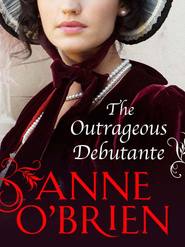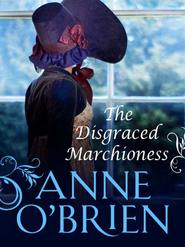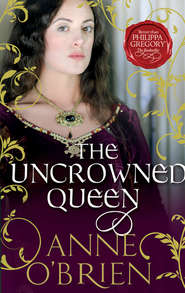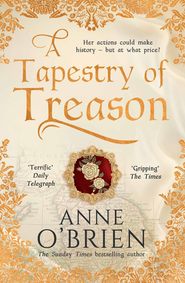По всем вопросам обращайтесь на: info@litportal.ru
(©) 2003-2025.
✖
Compromised Miss
Настройки чтения
Размер шрифта
Высота строк
Поля
Compromised Miss
Anne O'Brien
He remembers luminous grey eyes… and a mysterious gentle touch… Despite being unconscious for most of the night, Lucius has been accused of compromising a lady. She may not be an obvious beauty, dressed as she is in seaman’s garb, but his rescuer is all woman – and now he must marry Miss Harriette Lydyard.The Earl of Venmore is lethally attractive, and Harriette knows she should refuse him. Only with her reputation in tatters she must face the consequences of her actions – by making a pact with this disreputable, dangerous devil of a man!
Exasperated, Harriette pulled a knife from her belt and began to use it against the seams—it was ruined anyway.
The shirt of the finest linen, as she had suspected despite the muck and blood that soiled it, gave her no trouble. She had already used his once impeccably starched cravat as an impromptu padding. Her lips curved in contempt. Payment for state secrets must be high.
‘Miss Harriette, I think you should leave.’
‘Just do it, George.’
With a click of tongue against teeth George stripped off the man’s breeches, undergarments and hose. Well, now! Harriette was not ignorant of a degree of male nakedness. On board the cutter, when sailors stripped off their shirts to haul and pull on rope and sails, without embarrassment she had watched the play of smooth, well-defined muscle as arms and backs took the strain. As a member of the crew, she found it an occurrence that no longer disturbed her. A man was a creature of blood and bone and muscle, much like a horse, superbly crafted to carry out a task against the elements.
She had seen a half-naked man before. But nothing like this man, fully naked. Harriette found herself locked in a moment of splendid appreciation.
Anne O’Brien was born and has lived for most of her life in Yorkshire. There she taught history, before deciding to fulfil a lifetime ambition to write romantic historical fiction. She won a number of short story competitions until published for the first time by Mills & Boon. As well as writing, she finds time to enjoy gardening, cooking and watercolour painting. She now lives with her husband in an eighteenth-century cottage in the depths of the Welsh Marches.
You can find out about Anne’s books and more at her website: www.anneobrien.co.uk
Compromised Miss
Anne O’Brien
www.millsandboon.co.uk (http://www.millsandboon.co.uk/)
To George, again, who knows all about romance
Author Note
Since writing two medieval romances, I have returned to my first love: a Regency. It was in my mind to create a vital, strong-willed heroine whose lifestyle was not governed by the strict rules of Polite Society for a well-born lady. Most adventurous possibilities in this period were undoubtedly a male preserve. But some women clad themselves in boots and breeches, taking to the High Seas as pirates and smugglers, and this presented an exciting occupation for my heroine. And so Harriette Lydyard was created, playing the part of Captain Harry, with her French connections, her sleek little cutter and her lucrative smuggling run. A blood-stirring, eventful life for a heroine, if potentially scandalous, and with more dangers for her to face than she was aware of.
Such a vital heroine demanded a unique hero to take her on. This is Lucius Hallaston. If he is driven to pursue a life full of deceit and blackmail that smacks of the worst kind of treachery, so much the better. And if he has to struggle with his own dark secrets—then he is the perfect hero. Lucius is forced by circumstance to come to terms with a woman who proves to be as bold and as resourceful as he. A woman who has the courage to risk her life for him…
I know you will enjoy this passionate romance of scandal, betrayal and heart-stirring love. Lucius and Harriette have remained imprinted in my mind ever since I completed the last word to bring them together despite all odds.
Chapter One
The English Channel—July 1813.
‘Hurry! Sky’s clearing. Time we were gone.’
A sleek little English cutter lay off the French coast, hardly more than a shadow on the swell of a sullen sea and aptly named Lydyard’s Ghost, dark sails furled. The Captain who had issued the warning stood at the helm, one hand steady on the tiller, eyes ever alert, from shore to sky to the stowing of the bales and casks. A compact young man from what could be seen, clad as the rest of his crew in heavy boots, smock and wide trousers, a thick coat pulled over all and a stocking cap well down on his brow, he watched with innate authority. A half-dozen rowing boats headed smartly back to the French shore, to Port St Martin, only one remaining to complete the unloading—a fine brandy—of its illicit cargo.
The Captain acknowledged a sense of satisfaction. It had all gone according to plan so far.
‘That’s it, Cap’n Harry. All stowed aboard.’ An elderly, stout individual named George Gadie pushed himself away from the gunwale with a raised salute.
‘Excellent! Get the sails up, George.’ The Captain strode the length of the cutter with a leather purse in his hand, leaning to address the French smugglers in the rowing boat. ‘Au revoir, Monsieur Marcel. A lucrative cargo for us and a purse of guineas for you, as agreed. A bientôt, mon ami.’
‘A minute, Captain Harry, if you will.’ To the Captain’s surprise, Monsieur Marcel swung up into the cutter. ‘Another piece of cargo for you. Will you take it?’
The Captain frowned. ‘Is it worth my while?’
‘No.’ Marcel guffawed. ‘But we don’t want it, do we, lads? Hoist it up, Pierre.’ He gestured down to the sailors in the rowing boat who stood around a dark shape. Next moment it was lifted and pushed and finally tumbled over the side to fall aboard the cutter.
The Captain crouched to inspect. ‘What’s this?’
‘Pierre found him on the quay. A brawl—and he came off worst.’ Monsieur Marcel lifted his shoulders in deliberate contempt. ‘English, and not dead yet, that’s all I know. Pockets empty—robbed, I expect.’ Marcel was already climbing back over the cutter’s side. ‘All I know is he’s in with a disreputable crowd led by a slimy ruffian named Jean-Jacques Noir whose got his fingers in all sorts of foul pies. Noir’d sell his sister—damn! He’d sell his mother if it lined his pockets. And he’d use a knife against any man who stood in his way.’
The Captain stared down at the inert body at his feet. ‘What do I do with him?’
‘Take him back to England. Or drop him overboard if you wish.’ Still seated astride, Marcel grunted with fierce amusement. ‘He’s up to no good here. Most like a English spy, passing on information or guineas, if he’s in league with Jean-Jacques Noir. He obviously failed to meet Noir’s demands. A falling out of rogues, I expect…’ Marcel dropped back down into the rowing boat.
‘Tide’s turning, Cap’n Harry,’ George Gadie at the cutter’s bow warned.
‘Right.’ Looking across at the run of the waves, the Captain decided. ‘We must go, so he must come with us.’ A quick shake of hands, leaning down to Monsieur Marcel, and the heavy leather bag was tossed down to the French smuggler. ‘Here’s the gold as agreed.’
‘Enjoy the contraband. The brandy’s the best. And the silk.’
The Captain’s smile glinted in a shaft of moonlight as the clouds shifted to bathe the dark-painted cutter in silver. Sails, fore and aft, were set with impressive speed and the cutter put out to sea with its unexpected cargo.
Safely underway, the Captain beckoned to George Gadie, who promptly turned the body over with rough hands and a careless shove of his boot.
‘Let’s see what we’ve got here, George. Less value to us than a bolt of silk cloth…’
The words dried at the sight. Blood and sea water disfigured the shoulder, breast and sleeve of a well-cut coat. A man of means then, Captain Harry recognised, although the garment was now ruined beyond repair. The Captain pulled open the lapels to show where the white shirt beneath, of finest linen beneath his fingers, was also dark with blood. Spying, then, was a lucrative business, if a dangerous one, he decided without compassion, for the dark hair was slick and matted from a ragged cut above the hairline. He was soaked to the skin, the wound still bleeding, his face and lips starkly colourless, pale as death. Deep lines of pain were engraved between well-marked brows, also bracketing his mouth. A knife wound, not dangerous but sluggishly oozing blood, angled down his cheek. He was deeply unconscious but, crouching, the Captain could feel the steady heartbeat beneath the heel of his hand.
George grunted. ‘A spy, d’you think, Cap’n? Don’t look too dangerous now, does ‘ee? The knife scar’ll mar his pretty looks. Let’s get him out of the way. Gabriel…!’ Summoning his son, taking hold of shoulders and booted feet between them, they began to heave the dead weight against the boat’s side planking.
‘Wait.’ The Captain put out a hand, grasping Gabriel’s arm and crouched again. A weak groan came from the ashen lips. The man’s eyes, heavy with pain and confusion, opened.
‘Where am I?’ A hoarse croak of a whisper.
‘On your way back to England,’ Captain Harry informed.
‘No…I can’t. I can’t leave yet….’
‘No choice. You’ll do as I say.’ The Captain’s clipped reply was brutal.
A hand was lifted to curl weakly into the cloth of the Captain’s sleeve. The pain-racked eyes tried to focus. ‘Take me back. I’ll pay you…’
‘What with? You’ve no money in your pockets, my friend.’
‘I don’t remember…’ The eyes blurred with incomprehension, closed and then snapped open as if searching for a memory. ‘Jean-Jacques Noir…he broke his word….’
‘I expect he did. You were robbed, it seems.’ The Captain’s lips curled in derision, a thorough distaste for what this man represented. Smuggling was one thing. Was he himself not a skilled proponent of the trade, the name of Captain Harry well known along the coast of Suffolk? Nor was he ashamed of it. But spying for the enemy was quite another matter. The Gentlemen of the Free Trade had a code of honour to live by, whereas spying, handing over delicate information to England’s enemies, was despicable by anyone’s standards. ‘You were in a common brawl—perhaps you fell out with your French contacts.’
‘What?’ The eyes struggled again, without success, to focus. The line between the brows dug deeper. ‘I don’t remember…’
Anne O'Brien
He remembers luminous grey eyes… and a mysterious gentle touch… Despite being unconscious for most of the night, Lucius has been accused of compromising a lady. She may not be an obvious beauty, dressed as she is in seaman’s garb, but his rescuer is all woman – and now he must marry Miss Harriette Lydyard.The Earl of Venmore is lethally attractive, and Harriette knows she should refuse him. Only with her reputation in tatters she must face the consequences of her actions – by making a pact with this disreputable, dangerous devil of a man!
Exasperated, Harriette pulled a knife from her belt and began to use it against the seams—it was ruined anyway.
The shirt of the finest linen, as she had suspected despite the muck and blood that soiled it, gave her no trouble. She had already used his once impeccably starched cravat as an impromptu padding. Her lips curved in contempt. Payment for state secrets must be high.
‘Miss Harriette, I think you should leave.’
‘Just do it, George.’
With a click of tongue against teeth George stripped off the man’s breeches, undergarments and hose. Well, now! Harriette was not ignorant of a degree of male nakedness. On board the cutter, when sailors stripped off their shirts to haul and pull on rope and sails, without embarrassment she had watched the play of smooth, well-defined muscle as arms and backs took the strain. As a member of the crew, she found it an occurrence that no longer disturbed her. A man was a creature of blood and bone and muscle, much like a horse, superbly crafted to carry out a task against the elements.
She had seen a half-naked man before. But nothing like this man, fully naked. Harriette found herself locked in a moment of splendid appreciation.
Anne O’Brien was born and has lived for most of her life in Yorkshire. There she taught history, before deciding to fulfil a lifetime ambition to write romantic historical fiction. She won a number of short story competitions until published for the first time by Mills & Boon. As well as writing, she finds time to enjoy gardening, cooking and watercolour painting. She now lives with her husband in an eighteenth-century cottage in the depths of the Welsh Marches.
You can find out about Anne’s books and more at her website: www.anneobrien.co.uk
Compromised Miss
Anne O’Brien
www.millsandboon.co.uk (http://www.millsandboon.co.uk/)
To George, again, who knows all about romance
Author Note
Since writing two medieval romances, I have returned to my first love: a Regency. It was in my mind to create a vital, strong-willed heroine whose lifestyle was not governed by the strict rules of Polite Society for a well-born lady. Most adventurous possibilities in this period were undoubtedly a male preserve. But some women clad themselves in boots and breeches, taking to the High Seas as pirates and smugglers, and this presented an exciting occupation for my heroine. And so Harriette Lydyard was created, playing the part of Captain Harry, with her French connections, her sleek little cutter and her lucrative smuggling run. A blood-stirring, eventful life for a heroine, if potentially scandalous, and with more dangers for her to face than she was aware of.
Such a vital heroine demanded a unique hero to take her on. This is Lucius Hallaston. If he is driven to pursue a life full of deceit and blackmail that smacks of the worst kind of treachery, so much the better. And if he has to struggle with his own dark secrets—then he is the perfect hero. Lucius is forced by circumstance to come to terms with a woman who proves to be as bold and as resourceful as he. A woman who has the courage to risk her life for him…
I know you will enjoy this passionate romance of scandal, betrayal and heart-stirring love. Lucius and Harriette have remained imprinted in my mind ever since I completed the last word to bring them together despite all odds.
Chapter One
The English Channel—July 1813.
‘Hurry! Sky’s clearing. Time we were gone.’
A sleek little English cutter lay off the French coast, hardly more than a shadow on the swell of a sullen sea and aptly named Lydyard’s Ghost, dark sails furled. The Captain who had issued the warning stood at the helm, one hand steady on the tiller, eyes ever alert, from shore to sky to the stowing of the bales and casks. A compact young man from what could be seen, clad as the rest of his crew in heavy boots, smock and wide trousers, a thick coat pulled over all and a stocking cap well down on his brow, he watched with innate authority. A half-dozen rowing boats headed smartly back to the French shore, to Port St Martin, only one remaining to complete the unloading—a fine brandy—of its illicit cargo.
The Captain acknowledged a sense of satisfaction. It had all gone according to plan so far.
‘That’s it, Cap’n Harry. All stowed aboard.’ An elderly, stout individual named George Gadie pushed himself away from the gunwale with a raised salute.
‘Excellent! Get the sails up, George.’ The Captain strode the length of the cutter with a leather purse in his hand, leaning to address the French smugglers in the rowing boat. ‘Au revoir, Monsieur Marcel. A lucrative cargo for us and a purse of guineas for you, as agreed. A bientôt, mon ami.’
‘A minute, Captain Harry, if you will.’ To the Captain’s surprise, Monsieur Marcel swung up into the cutter. ‘Another piece of cargo for you. Will you take it?’
The Captain frowned. ‘Is it worth my while?’
‘No.’ Marcel guffawed. ‘But we don’t want it, do we, lads? Hoist it up, Pierre.’ He gestured down to the sailors in the rowing boat who stood around a dark shape. Next moment it was lifted and pushed and finally tumbled over the side to fall aboard the cutter.
The Captain crouched to inspect. ‘What’s this?’
‘Pierre found him on the quay. A brawl—and he came off worst.’ Monsieur Marcel lifted his shoulders in deliberate contempt. ‘English, and not dead yet, that’s all I know. Pockets empty—robbed, I expect.’ Marcel was already climbing back over the cutter’s side. ‘All I know is he’s in with a disreputable crowd led by a slimy ruffian named Jean-Jacques Noir whose got his fingers in all sorts of foul pies. Noir’d sell his sister—damn! He’d sell his mother if it lined his pockets. And he’d use a knife against any man who stood in his way.’
The Captain stared down at the inert body at his feet. ‘What do I do with him?’
‘Take him back to England. Or drop him overboard if you wish.’ Still seated astride, Marcel grunted with fierce amusement. ‘He’s up to no good here. Most like a English spy, passing on information or guineas, if he’s in league with Jean-Jacques Noir. He obviously failed to meet Noir’s demands. A falling out of rogues, I expect…’ Marcel dropped back down into the rowing boat.
‘Tide’s turning, Cap’n Harry,’ George Gadie at the cutter’s bow warned.
‘Right.’ Looking across at the run of the waves, the Captain decided. ‘We must go, so he must come with us.’ A quick shake of hands, leaning down to Monsieur Marcel, and the heavy leather bag was tossed down to the French smuggler. ‘Here’s the gold as agreed.’
‘Enjoy the contraband. The brandy’s the best. And the silk.’
The Captain’s smile glinted in a shaft of moonlight as the clouds shifted to bathe the dark-painted cutter in silver. Sails, fore and aft, were set with impressive speed and the cutter put out to sea with its unexpected cargo.
Safely underway, the Captain beckoned to George Gadie, who promptly turned the body over with rough hands and a careless shove of his boot.
‘Let’s see what we’ve got here, George. Less value to us than a bolt of silk cloth…’
The words dried at the sight. Blood and sea water disfigured the shoulder, breast and sleeve of a well-cut coat. A man of means then, Captain Harry recognised, although the garment was now ruined beyond repair. The Captain pulled open the lapels to show where the white shirt beneath, of finest linen beneath his fingers, was also dark with blood. Spying, then, was a lucrative business, if a dangerous one, he decided without compassion, for the dark hair was slick and matted from a ragged cut above the hairline. He was soaked to the skin, the wound still bleeding, his face and lips starkly colourless, pale as death. Deep lines of pain were engraved between well-marked brows, also bracketing his mouth. A knife wound, not dangerous but sluggishly oozing blood, angled down his cheek. He was deeply unconscious but, crouching, the Captain could feel the steady heartbeat beneath the heel of his hand.
George grunted. ‘A spy, d’you think, Cap’n? Don’t look too dangerous now, does ‘ee? The knife scar’ll mar his pretty looks. Let’s get him out of the way. Gabriel…!’ Summoning his son, taking hold of shoulders and booted feet between them, they began to heave the dead weight against the boat’s side planking.
‘Wait.’ The Captain put out a hand, grasping Gabriel’s arm and crouched again. A weak groan came from the ashen lips. The man’s eyes, heavy with pain and confusion, opened.
‘Where am I?’ A hoarse croak of a whisper.
‘On your way back to England,’ Captain Harry informed.
‘No…I can’t. I can’t leave yet….’
‘No choice. You’ll do as I say.’ The Captain’s clipped reply was brutal.
A hand was lifted to curl weakly into the cloth of the Captain’s sleeve. The pain-racked eyes tried to focus. ‘Take me back. I’ll pay you…’
‘What with? You’ve no money in your pockets, my friend.’
‘I don’t remember…’ The eyes blurred with incomprehension, closed and then snapped open as if searching for a memory. ‘Jean-Jacques Noir…he broke his word….’
‘I expect he did. You were robbed, it seems.’ The Captain’s lips curled in derision, a thorough distaste for what this man represented. Smuggling was one thing. Was he himself not a skilled proponent of the trade, the name of Captain Harry well known along the coast of Suffolk? Nor was he ashamed of it. But spying for the enemy was quite another matter. The Gentlemen of the Free Trade had a code of honour to live by, whereas spying, handing over delicate information to England’s enemies, was despicable by anyone’s standards. ‘You were in a common brawl—perhaps you fell out with your French contacts.’
‘What?’ The eyes struggled again, without success, to focus. The line between the brows dug deeper. ‘I don’t remember…’











